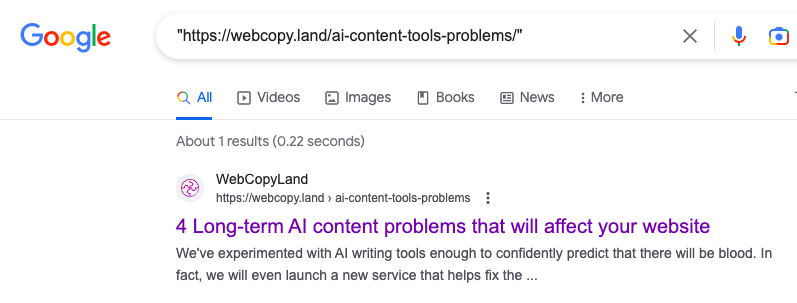We’ve been coming across websites suffering from bad indexation more and more often.
You’d think that in 2023 content indexation would not be an issue with all the computing power Google has.
But that’s not the case, and badly indexed content seems to be on the rise.
Most of the time these sites that are having indexation problems belong to one of the following categories:
Thin affiliate websites
These only publish product-related posts, fake reviews (authorts that rewrite product descriptions without ever laying their hands on the actual product), listicles like “X best products for Y” and other useless content.
Google has very little reason to index, let alone rank, content that has zero additional value.
If you are just publishing rehashed product descriptions adding “best” to the titles your affiliate blog will likely not be successful. The Best affiliate sites have evolved into magazines that produce content along the needs of their audiences.
E-commerce websites that repeat and cannibalize product pages with blog posts
Same story – if all you blog about is products then your blog adds no value even to your own store. Google is doing its best to detect and reward value – but this is not it.
Check out this list of E-Commerce blog post ideas for inspiration.
Blogs using AI-generated content
AI can’t produce good content and businesses trusting the AI writing tool hype are very likely have disastrous consequences in about a year.
Cheap and low-quality content
If your blog posts are written by someone who spent 0 time researching or coming up with genuine ideas, they can have a hard time getting into Google index as well.
We’ve written before how cheap low-quality actually costs you more money than it saves.
Now, it’s clear from the above list what the main indexation problems are.
Here’s how to avoid and fix bad indexation –
Check for technical issues
First things first, check if you have any tech issues preventing your blog posts from getting properly and timely indexed.
There is an “Indexing” section on Google Search Console that has a report on the indexation health of your website.
You can also inspect each individual URL on GSC and see if there are any issues that prevent it from getting indexed.
Here’s how you do it:

Paste the URL of your blog post into the “inspect any URL” field above and then click “request indexing”.
As you are only starting to blog, do it for every new blog post you pubish.
Publish proper, quality content
Here’s an example of a great post that we’ve randomly come across at one point. It’s long, detailed, researched, and it branches out into neighboring topics.
Good content should cost a lot of money, so you need to minimize your guesswork while coming up with topics to publish. So
Plan ahead and have a strategy that makes sense
Have a professional content plan that takes care of two main parts of blogging: our target market’s interests and lucrative SEO keywords that will bring you traffic.
Skewing towards one of the two directions is not going to make your blog as effective as it could’ve been.
Use internal links
You need to interlink all related posts on your blog generously, using keyword-rich link anchors.
The best part about internal links is you can get away with a lot more aggressive anchors than with inbound links. That makes internal links a good option to give a boost to your “money” pages for some of the toughest and the most commercial keywords.
Promote your content
If you are only publishing your blog posts but don’t promote them, you are not doing enough.
We’ve written about promoting content before – see this post on how to SEO your content after you publish.
The main idea is to get both bots and real human visitors to your every new blog post ASAP.
Quick ways to check if your content is getting indexed
You can Google the query site:yourdomain.com and see the amount of pages indexed:

You can also Google individual page URLs in quotes to see if these pages are indexed:

How well does your content get indexed? Are you on the right track? Reach out to us if you have any issues and we’ll do our best to help.
